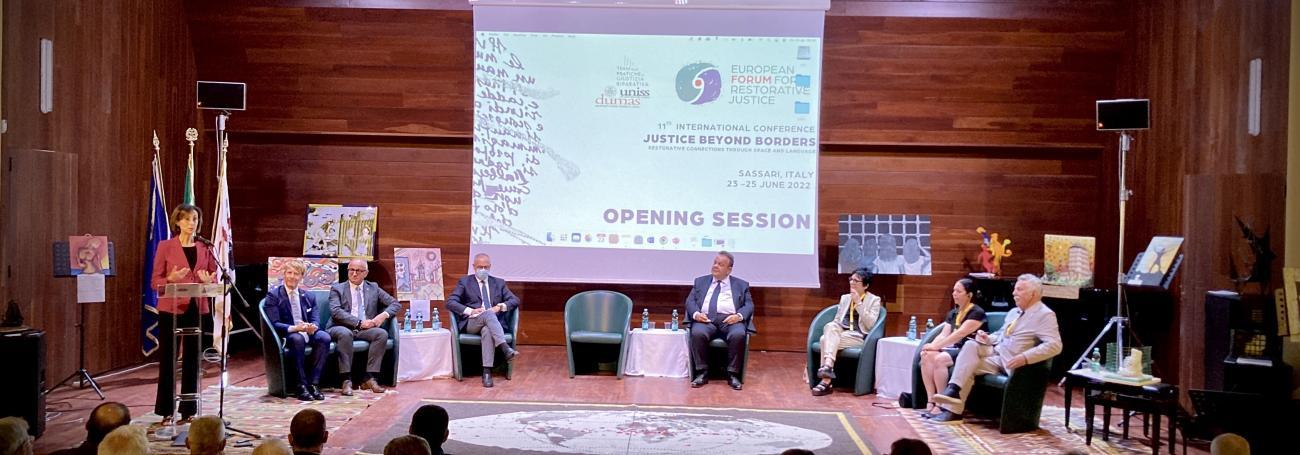Let me share with you the reasons why – as a scholar, as a former constitutional judge, as a minister of justice – I have been and indeed I am committed to develop a culture and a legal framework for restorative justice, in my country and on the European and International stage
My own turning point with restorative justice was experiential: besides my academic studies, I met restorative justice thanks to the Italian experience of restorative dialogues among victims and former members of armed groups of the age of political terrorism in the 70s and 80s. I had first the chance to come across these restorative experiences through the Libro dell’incontro (The Book of the Encounter) and then I had the chance to interact several times with the members of this restorative group. At that time, I was a member of the constitutional court and it was considered “unconventional” that a Constitutional Judge meet offenders – those offenders! - listen to them, talk to them, despite the wrongful (and often horrible) deeds they may have committed. Restorative justice made me feel at ease with these unlikely encounters particularly because they took place always in the presence of the victims, whom also I was able to meet, listen to, and acknowledge.
More relevant, I had the chance to witness the quality of the relationship between some of the victims and some of the offenders of that tragic page of the Italian history.
The encounter – l’incontro – seems to me the core of restorative justice: the encounter is the starting point of a new idea of justice, the idea of justice that I was looking for, that I was longing for.
Do you remember the famous U2 song?
And I still haven’t found what I was looking for….
After years and decades of study and work in the field of law and justice, after years in one of the most relevant institutions of the justice system – the Constitutional Court – I still hadn’t found what I was looking for…, the practice of justice that I was looking for.
It is difficult to explain. But those who have had the opportunity to witness to an experience of restorative justice know very well that it is the most convincing practice of justice available to us, human being.
Restorative justice: the practice of justice that we are looking for
Restorative encounters trigger new possibilities, initiate new paths, address complexity, and intervene meaningfully vis à vis the irreparable. This is not only because restorative outcomes are forward-looking, but because the presence of the other, of the most unlikely other, with whom to open a dialogue, brings about something that mysteriously is capable of quenching the thirst of justice.
Restorative justice seems more apt to address the justice needs of all those involved in stories of injustice, be they victims, responsible persons, bystanders, the community and the State.
Restorative justice ensures – even in highly conflictual and violent contexts – nonviolent, non-aggressive, safe, comfortable times and spaces where to find out the unexpected: something new that overcomes hatred, resentment, isolation, mistrust, revenge, the cycle of violence.
I am sure that we all share here a certain unease in addressing this promising matter, calling for peaceful coexistence among victims and perpetrators, in a moment where the war has come back at the heart of Europe. We have here a unique opportunity, though, to pay attention to the lessons conveyed by the witnesses of restorative dialogues: there are many here; to quote those mentioned in the programme: Ailbhe Griffith, the Encounter of the Encounters, the Parents Circle from Israel and Palestine, and others. Let them be our masters and teachers. Let us use the restorative lenses (to quote Howard Zehr, Changing lenses), to see through their stories and their journeys in search of peace and justice, a peaceful justice made of a just peace.
As a Minister of Justice, one of the main challenges, as you all know and work for, is to find the wise and realistic ways to embed restorative justice in the national and international justice systems.
On one hand, it seems necessary to avoid that restorative justice become an “added-on” or an “on the side” to criminal justice systems that remain unchanged. On the other hand, as widely recognised, restorative justice can sometimes be an alternative to criminal justice and many other times (more often) it can complement it: the issue here is how to craft an active relationship between the two; how to allow a fruitful interplay between restorative and the traditional instruments of criminal law.
There is still a lot to do, I think, for the cross-fertilisation between restorative justice in criminal matters and the law, the harmonisation of their respective languages, and the mutual reinforcement of their (indeed) common values and main objectives, especially if we refer to the Italian Constitutional provision of art. 27.
I think that we are at the beginning of a new era in the history of the idea of justice.


